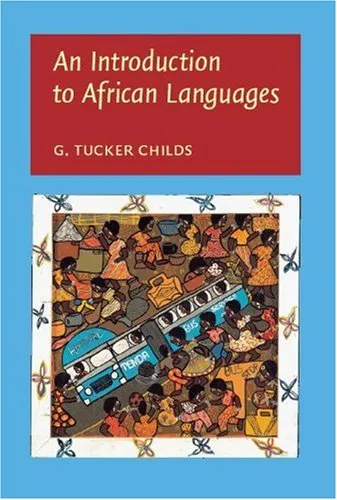An Introduction to African Languages
4.9
بر اساس نظر کاربران

شما میتونید سوالاتتون در باره کتاب رو از هوش مصنوعیش بعد از ورود بپرسید
هر دانلود یا پرسش از هوش مصنوعی 2 امتیاز لازم دارد، برای بدست آوردن امتیاز رایگان، به صفحه ی راهنمای امتیازات سر بزنید و یک سری کار ارزشمند انجام بدینکتاب های مرتبط:
Providing an introduction to the linguistic study of African languages, the orientation adopted throughout this book is a descriptive-structural-typological one, as opposed to a formal-theoretical approach. Formalisms are not eschewed per se but rather are invoked when they aid the central thrust of the book, which is to describe and characterize the languages of Africa in a succinct and concise manner, and to make the facts accessible to the unfamiliar reader. To say that the approach is typological means that a given structure is compared to structures of the same type (typically ones familiar to the readers), set within an established range of variation, and characterized as usual or unexpected. Further detail is also provided, where possible, in terms of the structure's synchronic distribution and diachronic origin. The text assumes at least some knowledge of language structure on the part of its readers, but nothing beyond that acquired in a first-year linguistics course. The book is organized by linguistic domain or sub-field within linguistics, and each of the chapters can be read independently. Readers can thus read selectively or read the book sequentially from cover-to-cover. Instructors can use the book as a text for a course in African languages or even language typology. There is generous indexing by topic, language and author; appendix two contains widely used alternative names for the languages discussed and directs readers to listings in the language index.
دانلود رایگان مستقیم
You Can Download this book after Login
دسترسی به کتابها از طریق پلتفرمهای قانونی و کتابخانههای عمومی نه تنها از حقوق نویسندگان و ناشران حمایت میکند، بلکه به پایداری فرهنگ کتابخوانی نیز کمک میرساند. پیش از دانلود، لحظهای به بررسی این گزینهها فکر کنید.
این کتاب رو در پلتفرم های دیگه ببینید
WorldCat به شما کمک میکنه تا کتاب ها رو در کتابخانه های سراسر دنیا پیدا کنید
امتیازها، نظرات تخصصی و صحبت ها درباره کتاب را در Goodreads ببینید
کتابهای کمیاب یا دست دوم را در AbeBooks پیدا کنید و بخرید



